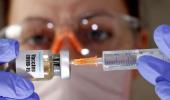A 90-year-old British grandmother, Margaret "Maggie" Keenan, on Tuesday became the first person in the world to receive the Pfizer/BioNTech jab against COVID-19 as the United Kingdom kicked off its biggest-ever vaccine campaign in history.

At 6:31 am GMT early riser Margaret, known to family and friends as Maggie, was given the life-saving jab by nurse May Parsons at her local hospital in Coventry to mark what the National Health Service has dubbed a "landmark moment" on V-Day or Vaccine Day in the fight against the deadly virus.
Maggie is among the first set of people contacted in advance by the NHS for the jab based on a predetermined health risk criteria.
The second person vaccinated was 81-year-old William Shakespeare from Warwickshire, who said he was "pleased" to be given the jab.
They're joined by an 87-year-old British Indian grandfather of nine Dr Hari Shukla and his 83-year-old wife who became the first Indian-origin couple in the world to get a vaccine against COVID-19.

"I feel so privileged to be the first person vaccinated against COVID-19, it's the best early birthday present I could wish for because it means I can finally look forward to spending time with my family and friends in the New Year after being on my own for most of the year," said Maggie, who turns 91 next week.
The former jewellery shop assistant who retired four years ago has a daughter, a son and four grandchildren and is looking forward to being able to go out again once she receives the top-up booster dose 21 days later.
"I can't thank May and the NHS staff enough who have looked after me tremendously, and my advice to anyone offered the vaccine is to take it, if I can have it at 90 then you can have it too," she said.
"It's a huge honour to be the first person in the country to deliver a COVID-19 jab to a patient, I'm just glad that I'm able to play a part in this historic day," said nurse Parsons.

Dr Shukla and his wife got injected with their first of two doses of the Pfizer/BioNTech jab at a hospital in Newcastle.
Shukla, a race relations campaigner based in Tyne and Wear, had been contacted by the NHS last week. His wife, Ranjan, then volunteered for the jab as she also falls within the first phase of people aged 80 and over, care home workers as well as NHS workers at high risk eligible to receive the "life-saving jab".
"I'm so pleased we are hopefully coming towards the end of this pandemic and I am delighted to be doing my bit by having the vaccine, I feel it is my duty to do so and do whatever I can to help," said Dr Shukla, who was born in Kenya and whose father hailed from Mumbai.
They have been picked based on the criteria set by the UK's Joint Committee on Vaccination and Immunisation phased rollout based on those at the highest risk of death from the deadly virus.
"Today marks a huge step forward in the UK's fight against coronavirus, as we begin delivering the vaccine to the first patients across the whole country. I am immensely proud of the scientists who developed the vaccine, members of the public who took part in trials, and the NHS who have worked tirelessly to prepare for rollout,” said British Prime Minister Boris Johnson.
However, he struck a note of caution to say that mass vaccination will take time, and therefore there was a need to remain "clear-eyed" about the challenges that remain.

Since the Pfizer vaccine got the green light from the Medicines and Healthcare products Regulatory Agency last week, the NHS said.
Its workers have been working around the clock to manage the huge scale logistical challenge of deploying the vaccine. Over the weekend, hospitals have begun inviting over 80s in for a jab and work with care home providers to book their staff into vaccination clinics.
"We will look back on today, V-day, as a key moment in our fight back against this terrible disease, and I am proud our health services across the United Kingdom are about to embark on our largest ever vaccination programme," said UK Health Secretary Matt Hancock.
"With over-80s and frontline health and care staff receiving their vaccinations from today, the whole country will breathe a collective sigh of relief as our most vulnerable loved ones start to be given protection from the virus.

"Now's the time to sit tight and remain patient until you get notified by the NHS that it's time for your vaccination. Until then, protect yourselves and the NHS by continuing to follow local restrictions. We can see light at the end of the tunnel but still have a long way to go,” he said.
The Pfizer/BionTech formula is an mRNA vaccine that uses a tiny fragment of genetic code from the pandemic virus to teach the body how to fight COVID-19 and build immunity.
The MHRA has stressed it has been cleared for mass rollout only after ‘rigorous’ safety tests despite the process being speeded up due to the urgency of finding an effective vaccine against a pandemic that has wreaked havoc around the world.
"Today is just the first step in the largest vaccination programme this country has ever seen. It will take some months to complete the work as more vaccine supplies become available and until then we must not drop our guard,” said NHS England chief executive Sir Simon Stevens, as he praised everyone involved in the first clinically approved COVID-19 vaccination for "achieving in months what normally takes years".











 © 2025
© 2025